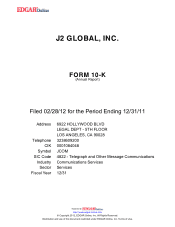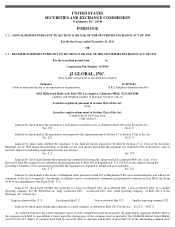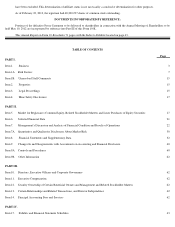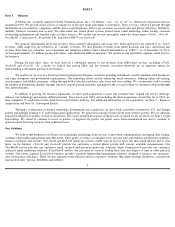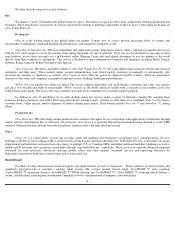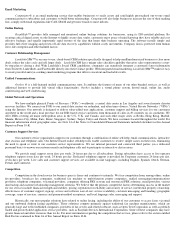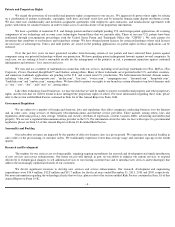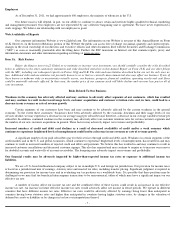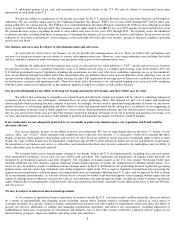eFax 2011 Annual Report Download - page 11
Download and view the complete annual report
Please find page 11 of the 2011 eFax annual report below. You can navigate through the pages in the report by either clicking on the pages listed below, or by using the keyword search tool below to find specific information within the annual report.
A substantial portion of our cash and investments are invested outside of the U.S. We may be subject to incremental taxes upon
repatriation of such funds to the U.S.
We may be subject to examination of our income tax returns by the U.S. Internal Revenue Service and other domestic and foreign tax
authorities. We are currently under audit by the California Franchise Tax Board (“FTB”)
for tax years 2005 through 2007 and by other state
taxing authorities for various periods. The FTB has also issued Information Document Requests regarding the 2008 tax year, although no formal
notice of audit for 2008 has been provided. The Company is also under audit by the IRS for tax year 2009 and has received verbal notice from
the Canada Revenue Agency regarding an audit of value added sales taxes for tax years 2009 through 2011. We regularly assess the likelihood
of adverse outcomes resulting from these examinations to determine the adequacy of our income tax reserves and expense. If our reserves are not
sufficient to cover these contingencies, such inadequacy could materially adversely affect our business, prospects, financial condition, operating
results and cash flows.
Our business and users may be subject to telecommunications and sales taxes.
As a provider of cloud services for business, we do not provide telecommunications services. Thus, we believe that our business and
our users (by using our services) are not subject to various telecommunication taxes. However, state taxing authorities may challenge this belief
and have and may continue to audit our business and operations with respect to telecommunications taxes.
In addition, the application of other indirect taxes (such as sales and use tax, value added tax (“VAT”),
goods and services tax, business
tax and gross receipt tax) to e-
commerce businesses such as j2 Global and our users is a complex and evolving issue. In November 2007, the
U.S. federal government enacted legislation extending the moratorium on states and other local authorities imposing access or discriminatory
taxes on the Internet through November 2014. This moratorium does not prohibit federal, state or local authorities from collecting taxes on our
income or from collecting taxes that are due under existing tax rules. The application of existing, new or future laws could have adverse effects
on our business, prospects and operating results. There have been, and will continue to be, substantial ongoing costs associated with complying
with the various indirect tax requirements in the numerous markets in which we conduct or will conduct business.
Our growth will depend on our ability to develop our brands and market new brands, and these efforts may be costly.
We believe that continuing to strengthen our current brands and effectively launch new brands will be critical to achieving widespread
acceptance of our services, and will require continued focus on active marketing efforts. The demand for and cost of online and traditional
advertising have been increasing and may continue to increase. Accordingly, we may need to spend increasing amounts of money on, and devote
greater resources to, advertising, marketing and other efforts to create and maintain brand loyalty among users. In addition, we are supporting an
increasing number of brands, each of which requires its own resources. Brand promotion activities may not yield increased revenues, and even if
they do, any increased revenues may not offset the expenses incurred in building our brands. If we fail to promote and maintain our brands, or if
we incur substantial expense in an unsuccessful attempt to promote and maintain our brands, our business could be harmed.
If our trademarks are not adequately protected or we are unable to protect our domain names, our reputation and brand could be
adversely affected.
Our success depends, in part, on our ability to protect our trademarks. We rely on some brands that use the letter “e”
before a word,
such as “eFax” and “eVoice”. Some regulators and competitors have taken the view that the “e”
is descriptive. Others have claimed that these
brands are generic when applied to the products and services we offer. If we are unable to secure and protect trademark rights to these or other
brands, the value of these brands may be diminished, competitors may be able to more effectively mimic our service and methods of operations,
the perception of our business and service to subscribers and potential subscribers may become confused in the marketplace and our ability to
attract subscribers may be adversely affected.
We currently hold various domain names relating to our brands, both in the U.S. and internationally, including efax.com and various
other international extensions, evoice.com, fax.com, onebox.com and others. The acquisition and maintenance of domain names generally are
regulated by governmental agencies and their designees. The regulation of domain names in the U.S. may change. Governing bodies may
establish additional top-
level domains, appoint additional domain name registrars or modify the requirements for holding domain names. As a
result, we may be unable to acquire or maintain relevant domain names in the U.S. Furthermore, the relationship between regulations governing
domain names and laws protecting trademarks and similar proprietary rights in the U.S. is unclear. Similarly, international rules governing the
acquisition and maintenance of domain names in foreign jurisdictions are sometimes different from U.S. rules, and we may not be able to obtain
all of our domains internationally. As a result of these factors, we may be unable to prevent third parties from acquiring domain names that are
similar to, infringe upon or otherwise decrease the value of our trademarks and other proprietary rights. In addition, failure to protect our domain
names domestically or internationally could adversely affect our reputation and brands, and make it more difficult for users to find our Websites
and our services.
We may be subject to risks from international operations.
As we continue to expand our business operations in countries outside the U.S., our future results could be materially adversely affected
by a variety of uncontrollable and changing factors including, among others, foreign currency exchange rates; political or
social unrest or
economic instability in a specific country or region; trade protection measures and other regulatory requirements which may affect our ability to
provide our services; difficulties in staffing and managing international operations; and adverse tax consequences, including imposition of
withholding or other taxes on payments by subsidiaries and affiliates. Any or all of these factors could have a material adverse impact on our
future business, prospects, financial condition, operating results and cash flows.
-
8
-

